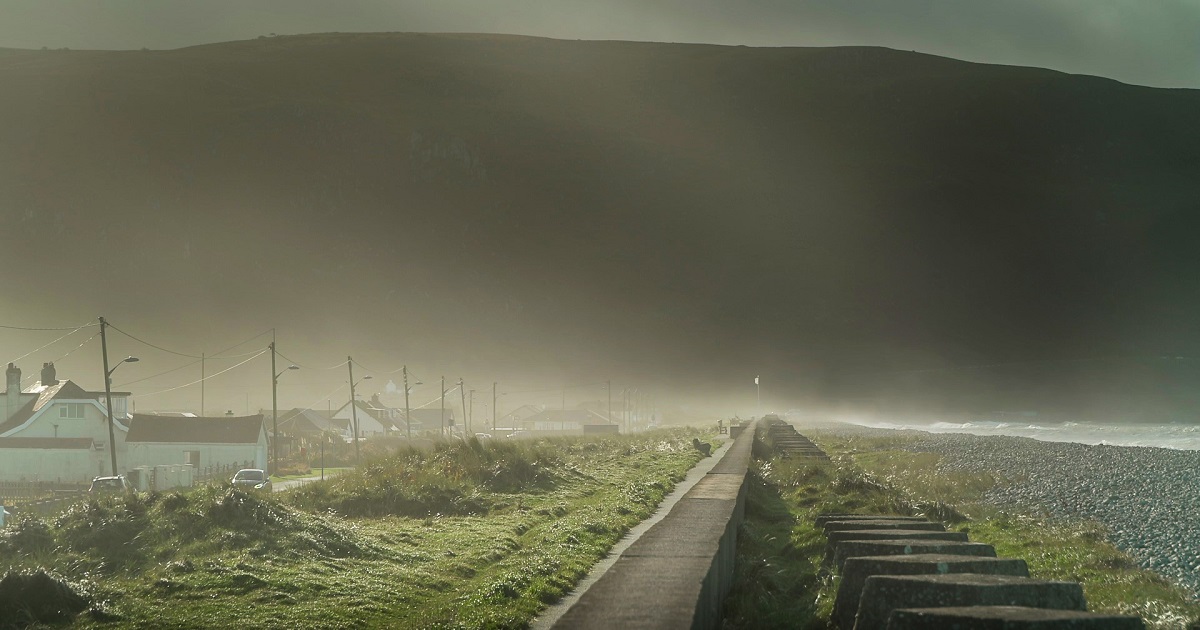New documentary tells the story of the Gwynedd village whose residents could become the UK’s first climate refugees

A special S4C television documentary will tell the story of the village in Gwynedd where residents will have to leave their homes in order to escape effects of the climate change emergency.
Fairbourne, near Dolgellau, is a popular seaside village protected from the sea by flood defences, which have received almost £7 million in investment over the past decade.
But, with sea levels forecast to rise over the next decades, as well as further risk of flooding from the nearby Mawddach river, Gwynedd Council decided in 2013 that work to strengthen the defences will not continue in the long term.
As a result, around 700 people who live in Fairbourne will have to leave their homes, with the village likely to be ‘decommissioned’ by the year 2054.
A special TV documentary, Fairbourne: Y Môr Wrth y Drws (Fairbourne: The Sea at the Door), which airs on S4C at 9.00pm on Tuesday 3 January, with English subtitles available, will tell the story of this modern Cantref Gwaelod and its population, who could become the first climate refugees in Britain.
During the programme, which was filmed over the course the last year, those at the frontline of the area’s climate change emergency will tell their personal stories.
Unique situation
Siân Williams, of Natural Resources Wales, said: “In Fairbourne, we have a quite unique situation, where there are three different flood risks. We have a flood risk from the sea, we have a flood risk from the river, and also because the land is so low, we also have a flood risk from the ground water.
“Fairbourne is not the only case, there are other areas in Wales and throughout Britain that have been identified as the same. The next thing we will need to do is go to those communities to see what will happen, and work with them to plan for the future.
“Fairbourne is the first but not the only case, unfortunately, where we will need to have discussions like this.”
Russell Isaac, of the United Nations Office for Disaster Risk Reduction (UNDRR), said: “You can put up defences, you can build walls, but at some point or another, the sea is going to flow in.
“There are a lot of people in this world who are concerned, and who are going to act. The problem is trying to get the right people to act – governments.”
Watch Fairbourne: Y Môr Wrth y Drws (Fairbourne: The Sea at the Door), on S4C at 9.00pm on Tuesday 3 January, or on demand on S4C Clic and BBC iPlayer. English subtitles available.
Support our Nation today
For the price of a cup of coffee a month you can help us create an independent, not-for-profit, national news service for the people of Wales, by the people of Wales.






It is either unique or it is not, NRW, you contradict yourself in the very next paragraph…
So what happens to the railway line, reopen the Ruabon line?
The point is, MM, you know the area well while some of the decision makers are either remote or have an ideological axe to grind. I’m not very familiar with the history of Fairbourne but was aware of other coastal communities where flood risk has been present ever since those places were settled. Very often the clue lies in the names of some of the access roads which give a not too subtle hint that it’s not a safe place to build!
When this was first announced the tone of cruel triumphalism against this ‘English Settlement’ was sickening…
Y traeth- Porthmadog – parcio ar gyfer portmeirion no6 rhai blynyddoedd yn ol-cofio?
Like The ‘Flash’ Leisure Centre Welshpool…
I won’t preempt the program but I hope N.C will allow us to revisit the subject once it has been broadcast hd…
Land reclamation has been around for a while now. 17 century Dutch engineers in the Fens, it went hand in hand with enclosures, the Romans did it, William Madocks did it, the Cambrian Railway did their bit hence all those caravan sites protected by failing railway embankments and Abermaw was able to come down off Gibraltar Rock otherwise I would have been born with my head in the waves but thanks to the Industrial Revolution etc the trend is being reversed as the sea levels rise. I hope this program does the subject justice, without casting aspersions…
Anybody watching Huw Edwards, tell me who was that young lady who says I don’t want a relief road so suck it up you fools…
My take, Wales is ruled by an executive and is hardly a democracy…
Sophie Howe, wow ! Who elected her?
I think you know the answer to that rhetorical Q. She is one of Labour’s “chosen”, a set of verbally fluent, superficially bright girls,boys ( and maybe inbetweens) who tick all sorts of boxes including the full mix of daiversity(of course). Don’t look too closely for any real abilities that might take the nation forward.